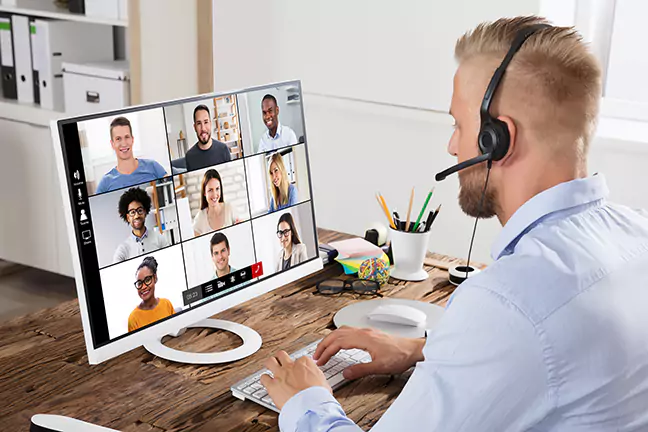In today’s recruitment landscape, virtual interviews have become a common method for hiring managers to find qualified candidates. As a hiring manager, mastering the art of conducting these interviews is crucial to identifying and securing top talent. From setting up your technology to effectively engaging with candidates, every aspect of the virtual interview process demands attention to detail and strategic planning.
We’ll cover these virtual interviewing tips and the essential best practices to ensure your virtual interviews are as efficient and productive as possible.
How Do You Structure Virtual Interviews Effectively?
To conduct a successful virtual interview, it’s essential to organize it thoughtfully. Start by setting a clear agenda—this not only keeps you on track but also signals to the candidate that you value efficiency and respect their time.
Before the interview, share this agenda with the candidate so they know what to expect and can prepare accordingly. This is particularly important in a first virtual job interview setting, where face-to-face cues are absent.
During the video interview, ensure the format allows for an interactive exchange. Begin with a brief introduction to set a welcoming tone and then proceed with the interview questions. Make your questions clear and concise, avoiding compound questions that can be confusing over a video call. Remember, a virtual interview should mirror the structure of an in-person interview, maintaining the same level of professionalism and thoroughness. You are not only assessing the candidates but also giving them a glimpse into your company’s culture and values.
Communicate with the Interviewees Clearly and Professionally
Effective communication is key in virtual job interviews. From the initial virtual interview invitation to post-interview follow-ups, ensure all communications are clear, professional, and reflective of your company’s values. When the hiring manager sends out the virtual interview invitation, include all necessary details—platform used (like Zoom or Google Meet), date and time, expected duration, and who will be present during the interview. This information helps prevent any confusion and allows the candidate to prepare properly, ensuring a smooth start to the interview.

Engage with the Candidate
During your virtual interview, it’s crucial to actively engage the candidate to mimic the dynamic of an in-person interaction.
As the interview progresses, focus on maintaining eye contact by looking at your camera, not just the screen. This simulates direct engagement and helps build a connection during remote interviews, making the candidate feel heard and valued. Encourage the candidate to ask questions about the role, the team, and the company culture. This not only provides them with valuable information but also allows you to gauge their interest and enthusiasm for the position.
Use open-ended questions that require more than a yes-or-no answer to encourage candidates to elaborate on their experiences and qualifications. For instance, instead of asking if they have experience in a particular area, ask them to describe a project they worked on that utilizes those skills. This approach not only gives you deeper insight into their capabilities but also keeps the conversation flowing more naturally.
How to Assess Candidates Effectively
To ensure a fair and thorough assessment of each candidate, it’s important to use the same criteria and questions for every interview. This consistency helps you make equitable decisions and reduces the likelihood of unconscious bias influencing the hiring process.
Prepare a list of competencies and skills that are critical for the position, and design your questions around these areas to get a clear picture of each candidate’s suitability.
Implement a scoring system or rubric for each question to standardize the evaluation process when interviewing candidates. This method allows you to objectively measure each candidate’s responses against the job requirements and makes it easier to compare candidates if you are conducting multiple interviews. Make sure to take notes during the interview to capture key points and impressions that will aid in your decision-making process.
After the interview, review your notes and scores to assess which candidates best meet the job requirements. This systematic approach to video interviews ensures that your final decision is based on relevant qualifications and experiences, helping you select the best candidate for the job.
How to Handle Video Interview Technical Issues Gracefully
Technical difficulties are inevitable in virtual settings, but how you handle them can set the tone for the interview. Before beginning, confirm that both your internet connection and that of the candidate are stable. This proactive step can prevent disruptions and demonstrates your commitment to a smooth online interview process.
However, should issues arise, such as audio glitches or connectivity problems, stay calm and have a backup plan ready, such as switching to a phone call or rescheduling the interview if necessary.
During the interview, if the candidate experiences technical difficulties, show understanding and patience. This approach not only alleviates their stress but also reflects positively on your company’s culture. It’s beneficial to rehearse handling these scenarios beforehand, so you are well-prepared to guide the candidate through any technical resolution steps efficiently. This readiness ensures that technical issues do not unduly influence your assessment of the candidate’s capabilities.

Follow-Up Professionally
After the virtual interview, it’s crucial to follow up with the candidate promptly. This step is often overlooked, but it’s vital for maintaining a positive candidate experience and reinforcing your company’s professional image. Send a thank-you email summarizing the interview and outlining the next steps. This communication should be clear and timely, ideally sent within 24 hours of the interview.
If the candidate progresses to the next stage, provide detailed information about what to expect next, whether it’s a second interview, a skills assessment, or meetings with other team members. If they aren’t moving forward in the hiring process, it’s equally important to inform them respectfully and, if appropriate, provide feedback that could be helpful for their future applications. Maintaining transparency and open communication not only enhances your reputation but also builds respect and trust with potential future candidates.
Demonstrate Professionalism Throughout
Ensuring professionalism throughout the virtual interview process is critical. From the moment you send out the virtual interview invitation to the video call interviews and the final follow-up, each interaction should reflect the high standards and values of your organization. Dress appropriately for the interview, even though it is virtual. Opt for business attire that aligns with your company’s dress code to convey professionalism.
During virtual interviews, be punctual and respect the scheduled start and end times, which shows respect for the candidate’s time and schedule. Keep your demeanor professional and polite throughout the interaction, ensuring you listen attentively and respond thoughtfully to the candidate’s questions. Your conduct during the interview not only assesses the candidate but also represents your company’s culture and work environment.
Increase Your Effectiveness by Applying These Help Tips for Hiring Managers
Mastering virtual interviews requires careful preparation, effective communication, and consistent follow-through. By adhering to the best practices outlined, you can improve your virtual interviewing skills, making the process smoother and more effective for both you and the candidates. Remember, the quality of your online interviews reflects directly on your company and can influence a candidate’s decision to join your team.
Stay updated on the latest virtual interviewing technologies and continually seek feedback from candidates and colleagues to refine your approach to remote interviews. As the virtual workplace evolves, so too should your strategies for engaging and recruiting top talent. By doing so, you ensure your organization remains competitive and appealing to job seekers in a dynamic job market.